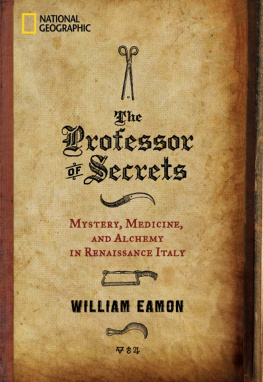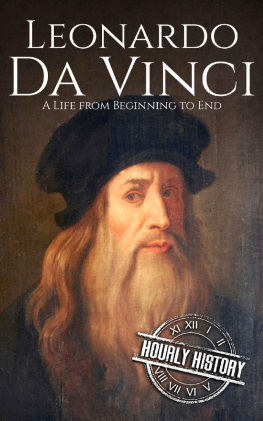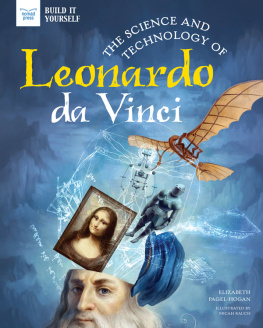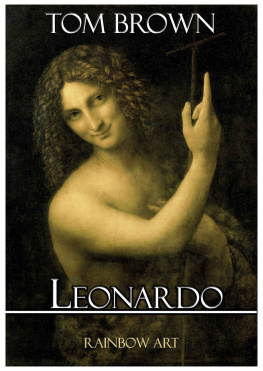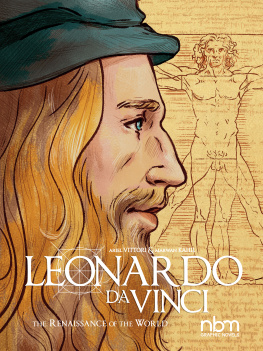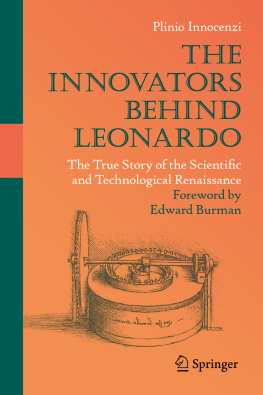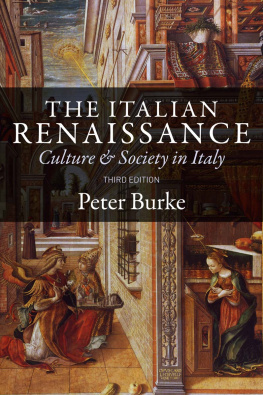For more information, please call 1-800-NGS LINE (647-5463) or write to the following address:
For rights or permissions inquiries, please contact National Geographic Books Subsidiary Rights: ngbookrights@ngs.org
Prologue
EXPERIENCE AND MEMORY
Bolognese doctor Leonardo Fioravanti paced his cell, outraged by the indignity hed suffered. And who wouldnt be? Ever since he arrived in Milan in the early 1570s, the citys physicians had been plotting against him. But this time theyd gone too far, sending officers of the Provveditori alla Sanit, or Public Health Board, to arrest him and throw him in prison on the dubious charge of not medicating in the canonical way.
Fioravanti was no common barber-surgeon. Nor was he one of those wandering charlatans who would suddenly show up in the town square, hawk a few nostrums, then just as quickly disappear. He was a physician, holding degrees from Italys preeminent medical school, the University of Bologna. Yet hed languished in jail for eight days now without anyones heeding his protestations of innocence.
Unable to contain his anger any longer, Fioravanti asked the prison guard for pen and paper. He then drafted a letter to Milans public health minister, taking care to address him in the properthat is to say obsequiousmanner. He introduced himself as Leonardo Fioravanti of Bologna, Doctor of Arts and Medicine, and Knight. He wrote his protest in a measured tone, but didnt hold back, demanding to be allowed to medicate freely as a legitimate doctor. Then he sealed the letter, dated it 22 April 1573, and paid the jailhouse guard to entrust it to a messenger, who would carry it to the Sanit office at the ducal palace in the Piazza del Duomo.
The next day, Niccolo Boldoni plucked Fioravantis letter from the pile of documents on his desk. As Milans protophysician (protofisico), or public health minister, Boldoni oversaw every aspect of the citys medical profession. His duties entailed a seemingly endless grind of routine bureaucratic tasks: examining barber-surgeons and midwives, collecting fees, imposing fines, inspecting pharmacies, ruling on petitions and appeals.
On the face of it, there was nothing unusual about the letter Boldoni was about to open: He would have read plenty of complaints from disgruntled healers. After breaking the wax seal that fastened the edges of the letter and opening it, however, Boldoni must have immediately recognized that the appeal before him was like no other.
A vile plot was afoot, the angry supplicant protested. The town physicians were behind it. They had accused him of poisoning his patients, yet the real reason for his incarceration was pure and simple envy:
Seeing that Ive cured and saved so many sick people in this and many other cities of Italy with such beautiful and excellent remedies unknown to any of them, and seeing that my fame continues to grow because of it, the physicians dont want me, a foreigner settled in Milan, to demonstrate the virtue that God, nature, and long experience have taught me.
To prove the worth of his doctrine, which he called the New Way of Healing, Fioravanti issued a challenge: Let there be consigned to me alone twenty or twenty-five sick people with diverse ailments and an equal number with similar infirmities to all the physicians of Milan. If I dont cure my patients quicker and better than they do theirs, Im willing to be banished forever from this city. The results, he predicted, would demonstrate once and for all that true medicine is proved only by experience.
We can only imagine what Boldoni made of this preposterous challenge. Did the town physicians accept Fioravantis dare? It seems unlikely, but the historical record is mute. In any event, the court set him free.
LEONARDO THE MIRACULOUS
This was hardly the first time that Leonardo Fioravanti had run afoul of the medical establishment. By 1573 his defiance of conventional medical doctrine was legendary. He had journeyed to Milan from Venice, where the College of Physicians had accused him of fraud and endangering the peoples health with his unorthodox treatments. Before that, Fioravanti had been chased out of Rome by a cabal of physicians. Yet when he visited Sicily in 1548, his miraculous cures earned him accolades as a new Asclepius. And while serving as a military surgeon in the Spanish navy during the war against the Turkish corsairs in Africa, Fioravanti became famous for his novel treatment of gunshot wounds. Only a few years after the Milan affair, he would travel to Spain and to the court of King Philip II, where the people would proclaim Leonardo Fioravanti a saint, a prophet, and a necromancer.
Contemporaries lavished similar paeans on his healing prowess. A Venetian poet called him an angel of paradise, sent by God to earth for the health and preservation of human life after Fioravanti cured him with miraculous success of a brutal gunshot wound to the head. Abrasive and contentious, Fioravanti made enemies wherever he went; his battles with the medical establishment made him a virtual symbol of the Renaissance charlatana reputation that would shadow him long past death.
To some, Leonardo Fioravanti was a ridiculous and dangerous quack; to others, he was a veritable savior. Unlike the commonplace charlatans of the day, Fioravanti didnt mount a portable scaffold and pitch his remedies to a crowd in a piazza. Yet he was a prolific author who marketed his cures with equal parts originality and theatricality. In the books he wrote for middlebrow readers, he launched a new kind of medical advertising that would survive for centuries, even as his cures faded from memory. Fioravanti was an ordinary surgeon who catapulted himself from obscurity to become one of the most famous healers of the Renaissance. The scourge of the regular doctors, he lashed out against their abuses and accused them of having extinguished the light of true medicine. In so doing, he became one of historys first medical celebrities. In the minds of his readers he was Fioravanti of the miracles, and through the miraculous medium of print he gained a devoted following.

